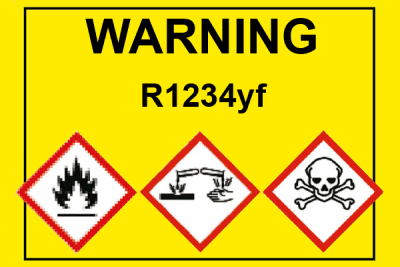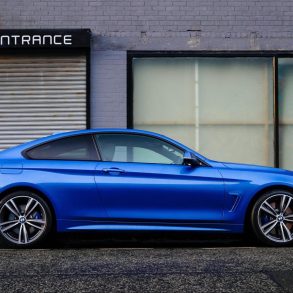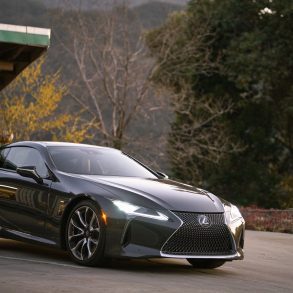
 In a press conference in Brussels yesterday, the European Commission announced they would start legal proceedings against the German government over non-compliance with the 2006/40/EC directive, concerning the refrigerant in automobile air conditioners, and allowing the continued use of the banned refrigerant R134a in A/C systems of certain new types of vehicles, notably those of Mercedes-Benz.
In a press conference in Brussels yesterday, the European Commission announced they would start legal proceedings against the German government over non-compliance with the 2006/40/EC directive, concerning the refrigerant in automobile air conditioners, and allowing the continued use of the banned refrigerant R134a in A/C systems of certain new types of vehicles, notably those of Mercedes-Benz.
What’s going on?
Air conditioners rely on refrigerant fluids that are compressed and then expand rapidly when a cooling effect is desired. Unfortunately, these coolants have had a horrible effect on the earth’s environment. The original refrigerants, from decades ago, were based on chlorofluorocarbons (CFCs), which was later proven to damage the ozone layer. When they were banned, the current refrigerant R134a was introduced, but this still has a 1400 times larger effect on global warming than carbon dioxide (CO2), when released into the air due to system leakages, in case of a crash or due to improper disposal at the end of a car’s life.
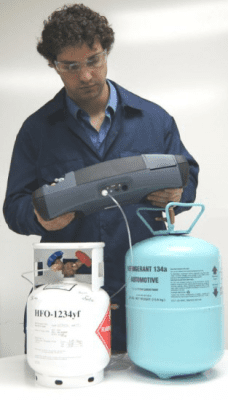 Therefore, the European Union has introduced the 2006/40/EC directive, effective from 2011, which forbids the usage of gases with a global warming potential (GWP) greater than 150 (150 times the effect of CO2) to be used in newly introduced vehicles. A newly designed refrigerant, patented by Honeywell and DuPont, is called R1234yf, and this has a GWP of 4. This marks an improvement of a factor 350 compared to the current refrigerant. Sounds pretty good, right?
Therefore, the European Union has introduced the 2006/40/EC directive, effective from 2011, which forbids the usage of gases with a global warming potential (GWP) greater than 150 (150 times the effect of CO2) to be used in newly introduced vehicles. A newly designed refrigerant, patented by Honeywell and DuPont, is called R1234yf, and this has a GWP of 4. This marks an improvement of a factor 350 compared to the current refrigerant. Sounds pretty good, right?
Well….. Problem is, CO2 seems to be not only more environmentally safe (it has a GWP of 1), but safer in case of an accident as well: Daimler-Benz, the parent company of Mercedes-Benz, are currently working on an air conditioning system based on CO2 (named R-744). And the environmental effects aren’t even the company’s biggest concern: they are more worried about the safety of Honeywell’s R1234yf refrigerant. Most notably the safety of rescue workers and fire fighters, who are backing Daimler’s claims and are asking the EU for leniency until this matter has been cleared once and for all.
The new refrigerant has been run through numerous laboratory tests and crash tests carried out by international vehicle manufacturers and independent institutions, and has been proven to be safe under the legally prescribed testing requirements. However, Daimler carried out a series of additional tests on the new refrigerant as part of a real-life test scenario which goes above and beyond those standard requirements. Results from those tests demonstrate that the refrigerant, which is otherwise difficult to ignite under laboratory conditions, does indeed prove to be flammable in a hot engine compartment. Similar tests of the current R134a refrigerant did not result in ignition. Moreover, when fire fighters attempt to extinguish the flames burning the R1234yf refrigerant, toxic gases may be released into the atmosphere, harming the rescue workers and others in the vicinity of the vehicle.
What happened next?
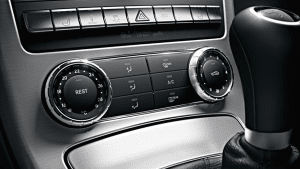
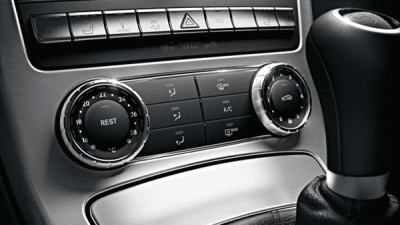 Daimler made clear to the authorities they would not use the new refrigerant, as they are working on a more environmentally friendly and safer air conditioning system based on CO2. In the meantime, they asked German authorities to be allowed to continue the use of the old R134a refrigerant in 3 of its new models during a transition period for the development of CO2 air conditioning systems by end 2016. They used a loophole in the law, claiming the new generations S-class limousine and B-class minivans among others to be no more than just facelifts of the previous models, and therefore still were eligible to use R134a based on the type approval of the outgoing models. French authorities then refused to allow Mercedes-Benz’s new A-Class, B-Class and CLA to be registered in that country from June 12, 2013. This decision was overruled by the French court at the end of August.
Daimler made clear to the authorities they would not use the new refrigerant, as they are working on a more environmentally friendly and safer air conditioning system based on CO2. In the meantime, they asked German authorities to be allowed to continue the use of the old R134a refrigerant in 3 of its new models during a transition period for the development of CO2 air conditioning systems by end 2016. They used a loophole in the law, claiming the new generations S-class limousine and B-class minivans among others to be no more than just facelifts of the previous models, and therefore still were eligible to use R134a based on the type approval of the outgoing models. French authorities then refused to allow Mercedes-Benz’s new A-Class, B-Class and CLA to be registered in that country from June 12, 2013. This decision was overruled by the French court at the end of August.
How did Honeywell react?
While dismissing Daimler’s concerns, Honeywell did indicate that air conditioning systems do need to be modified in order to use R1234yf safely. Besides that, they say their refrigerant passes all legally required safety tests and they claim that the risk of exposure to fire or toxic gases -even in light of Daimler’s claims- remains at a million times lower than a vehicle fire by all other causes. This should not come as a surprise, have you ever seen a company publicly state that their product (especially one on which they have a monopoly) is unsafe?
What’s up with CO2-based air conditioning?


 CO2 is cheap, worldwide available and, despite its negative image as a greenhouse gas, it is a 100% natural product, much more environmentally friendly than an artificially produced chemical. The servicing of CO2 systems will be less costly and less complicated than that for present systems. And it will offer no dangers to rescue workers or bystanders in case of a vehicle crash. Daimler, Audi, BMW, Porsche and VW have since stated publicly their intention to develop CO2-based air conditioning systems. But that will take some time. They are working on the development of CO2 as quickly as possible “since it is the only solution to ensure highest safety and environment requirements”, and avoiding unnecessary but also still unknown environmental and safety risks. In the meantime, they are fighting to be able to keep using the existing R134a refrigerant.
CO2 is cheap, worldwide available and, despite its negative image as a greenhouse gas, it is a 100% natural product, much more environmentally friendly than an artificially produced chemical. The servicing of CO2 systems will be less costly and less complicated than that for present systems. And it will offer no dangers to rescue workers or bystanders in case of a vehicle crash. Daimler, Audi, BMW, Porsche and VW have since stated publicly their intention to develop CO2-based air conditioning systems. But that will take some time. They are working on the development of CO2 as quickly as possible “since it is the only solution to ensure highest safety and environment requirements”, and avoiding unnecessary but also still unknown environmental and safety risks. In the meantime, they are fighting to be able to keep using the existing R134a refrigerant.
Some opponents argue that CO2-based systems are more expensive than current systems and future chemical blends as it requires the design of completely new high-pressure systems where so-called “drop-in solutions” (the adaptation of current systems to new substances like R1234yf) would be more cost-efficient. However, due to lower cost of the gas and the servicing of the system, these costs would be recovered during the vehicle’s lifetime.
Besides that, R1234yf is patented by a joint venture of two chemical companies, which effectively gives them a monopoly on the supply of this chemical. This may explain why the gas itself is so ridiculously expensive.
How will this dispute end?
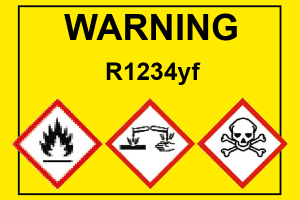
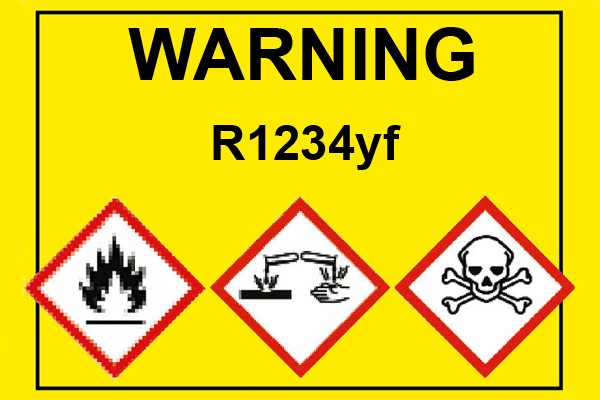 Well, for one: it is a classic tale of one powerful multinational against the other, in this case Honeywell vs. Daimler, so they will be lawyered up to their teeth and it would have been a matter of who has the deepest pockets or the longest breath. However, Honeywell seems to have hired the best lobbyists, with the EU now stepping in between.
Well, for one: it is a classic tale of one powerful multinational against the other, in this case Honeywell vs. Daimler, so they will be lawyered up to their teeth and it would have been a matter of who has the deepest pockets or the longest breath. However, Honeywell seems to have hired the best lobbyists, with the EU now stepping in between.
I am more than thrilled the EU has decided to set a measurable standard (the 2006/40/EC directive, which forbids the usage of gases with a GWP >150) instead of “prescribing” a specific solution or product, as this would have given reasonable doubt about their integrity and they would have been subject to speculations of bribery.
I believe in freedom of choice, so let the market (in this case the auto manufacturers) decide which refrigerant is best: the R1234yf by Honeywell or the CO2-based system that Daimler and others are working on.
But if Daimler ends up being right about the safety of R1234yf, you can bet Honeywell will need more lawyers than it can find as soon as the first casualties happen.

